- Home
- Jennifer Moore
Lady Helen Finds Her Song
Lady Helen Finds Her Song Read online
Cover images: Woman © Lee Avison / Trevillion Images, and Jaswant Thada Rajah Memorial in Jodhpur © Sira Anamwong
Cover design copyright © 2016 by Covenant Communications, Inc.
Published by Covenant Communications, Inc.
American Fork, Utah
Copyright © 2016 by Jennifer Moore
All rights reserved. No part of this book may be reproduced in any format or in any medium without the written permission of the publisher, Covenant Communications, Inc., P.O. Box 416, American Fork, UT 84003. The views expressed within this work are the sole responsibility of the author and do not necessarily reflect the position of Covenant Communications, Inc., or any other entity.
This is a work of fiction. The characters, names, incidents, places, and dialogue are either products of the author’s imagination, and are not to be construed as real, or are used fictitiously.
ISBN 978-1-52440-047-7
For my sister Mandy.
Because she loves India.
And I love her.
Acknowledgments
How can I ever begin to acknowledge all of the wonderful people who make my life easier so I can do what I love?
Thank you to Frank and my boys for all the support you give, the interest you show, and for making me feel like I’ve won the amazing-family lottery every day.
Thanks, Mandy Kimball, Kerri and Alan Erickson, Dan Schwebach, and Chris Miller for showing me pictures and video from your time in India and for answering so many questions. That’s the best kind of research.
So much thanks to Jen Ward, Margot Hovley, Mandy Kimball, and Kerri Erickson for reading my rough draft and helping me smooth out the roughest parts.
Nancy Allen and Josi Kilpack, your help, as always, makes my stories the best they can be. And Carla Kelly, thank you for answering random research questions that I can’t quite figure out. I don’t know what I’d ever do without you.
And thank you to Stacey Turner and the team at Covenant for catching so many embarrassing errors, polishing, designing, marketing, and turning this story into a beautiful book that I am so proud of. So many people are involved in creating the final product, and I could not be more grateful for your faith in me.
Chapter 1
Lady Helen Poulter stood on the deck of the ship, her gloved fingers tapping on the railing, playing invisible keys in a melody that only she could hear. The vessel made slow progress up the sandy-banked Hooghly River. During the three days since the ship had left behind the blue waters of the Bay of Bengal on its course toward Calcutta, Helen had watched as the river gradually narrowed and the muddy banks covered with scrubby plants gave way to green fields. Trees with smooth, twisted trunks spread their branches over the riverbanks, their long vines trailing in the water, and occasionally Helen caught sight of a village through the thick vegetation. The Hooghly was more than twice as wide as the Thames and much longer—they’d been riding it for three days.
She watched the river come to life in the early morning. Women in brightly colored apparel chatted together as they washed clothing and bathed brown-skinned children. Water buffalo were driven along the shores by men in loose-fitting trousers. A flock of green-and-red parrots burst from the trees, rising in a chaos of shrieks and flutters.
Helen could not believe she was the only passenger on deck while such spectacular sights occurred. How could the others bear to remain inside their cramped quarters? Every sight around her was new and fascinating.
The shallow river with its gentle waves was a welcome change from the endless tossing of the sea. For nearly four months, she and the other passengers had braced themselves against the violent storms of the south Atlantic, then shivered in the bitter cold of the Cape of Good Hope, and finally sweltered in the hot sun of the Indian Ocean.
From the first days when she’d lain in her berth, overcome by seasickness, Helen had spent the entire voyage questioning her decision to accompany her mother and her mother’s new husband, Brigadier-General Jim Stackhouse, to his latest military assignment in India. She missed her friends and siblings. She missed her home in Somerset, and she missed her pianoforte. But in spite of her homesickness, she felt a rush of excitement as she contemplated what awaited her in India. Aside from London and one summer in Bath, she’d never traveled anywhere; she had been elated—and a bit surprised—when her mother had allowed her to come along.
She turned her eyes from the colorful birds and walked along the rail, admiring the view ahead, with the rising sun reflecting pink and yellow on the swells and dips of the water. A flurry of movement on the far bank caught her eye, and she crossed the deck, nodding at the sailors who tipped their hats or bowed their heads in greeting. When she reached the starboard side of the ship and peered across the water, she saw that the activity was actually some sort of procession. In the center of the bustling crowd was an elephant. The animal’s skin was painted in bright colors, and between its eyes hung an elaborate metal headpiece. Ornate silks covered its back, and atop them rode a man in a white turban.
Helen pressed her fingers against her lips to stifle a gasp. She had seen an elephant once before in the Prince Regent’s menagerie at the Tower, but she never would have imagined a sight like this. The colorful elephant looked as if it were dancing. It raised and lowered its head, swinging its trunk as it marched. The man rocked from side to side in his seat as the people surrounding him cheered and sang. Even from this distance, she could sense the group’s excitement.
“I should have known you would already be on deck,” said a voice behind her.
Helen turned and curtseyed quickly to her new stepfather. “Good morning, sir.” She smiled as she thought how, only a few months earlier, she would have shied away nervously at finding herself alone with Jim Stackhouse. But she had grown accustomed to his curt manner and found that, beneath his gruff exterior, he was thoughtful and kind—although she did not think he would welcome that observation. Jim used his scowl and stern temperament as a tool to keep soldiers in line and to repel people who irritated him. He had asked her numerous times to call him Jim, but Helen wasn’t quite comfortable enough to address him so familiarly. She waved her hand toward the elephant. “What do you think is happening?”
He inclined his head in greeting; then his gaze moved past her to the commotion on the bank. “A wedding party. That man is journeying to the home of the woman his parents and matchmakers have chosen. Until they are married, he will never have met his bride or even seen her face. She will have been chosen because of her caste and her family’s status in society.”
“Marrying a person one has never seen? It sounds like a terrible idea,” Helen said.
Jim turned his attention fully to her, pulling his brows together and tipping his head to the side. “Why is that?”
What if he is not handsome? she thought but did not say it aloud. The patch over Jim’s eye and the jagged scar that cut through his face deterred her. He might take offense to such a statement. “What if they do not like each other?” she answered instead. “I would not wish to marry someone without the chance to determine whether either of us feels any affection. It is a strange custom.”
“The custom is not so very different in England, is it?” The manner in which he asked the question and then turned, clasping his hands behind his back to watch the bridegroom’s entourage indicated that Jim did not expect a reply; although Helen knew he would welcome it if she chose to answer.
Helen would have normally felt uncomfortable speaking about the delicate topic of matrimony with a man, but over the long voyage as she had come to know Jim, she had found that her stepfather listened closely to what she said and considered her opinions, never acting as if her thoughts were unimporta
nt even when he did not agree. As the youngest child, she had become accustomed to being ignored or being treated as though her words were of little consequence, and Jim’s interest made her feel special.
She stood next to him, watching the activity on shore and considering what he had said. Was marriage truly the same in England? She thought back to her London Season last spring and realized she had seen firsthand the truth in his statement. Her friends and acquaintances had painstakingly measured the qualities of each and every eligible bachelor, discussing for hours which would make the best husband based on his rank in society as well as the value of his family holdings. Even her own brother’s and sisters’ marriages, she thought, were decidedly a jointure of convenience with the purpose of furthering the family’s interest through growing their holdings and producing well-bred heirs. Marriage in England was certainly similar to the arrangement in India, but Jim, of all people, should know it wasn’t the same.
She glanced around the rim of her bonnet at the man who stood beside her. Jim and her mother’s marriage was different. She had been initially distressed at the idea of her mother being remarried. Helen had a special relationship with Lady Patricia and didn’t like the idea of a new person coming between them. But over time, she had gotten used to the idea and thought more about the relationship she had seen between her parents. As a child, she had assumed her mother and late father got on well enough, but looking back with a more mature eye, she realized that aside from events they were both expected to attend, they rarely spent time in each other’s company. And she had never seen any hint affection between the two. Tolerated was the word she would use to describe her parents’ interactions.
Once she had seen her mother with Jim, Helen realized the difference. Although most people were frightened or repulsed by Jim Stackhouse’s appearance and manner, Lady Patricia glowed in his presence. Helen noticed that the two sought each other’s company, even changing plans in order to spend time together. They drifted toward each other when they were together in a room, and though she knew they didn’t intend for anyone to see, Helen had observed hands clasped beneath a table and soft looks exchanged. Jim never spoke in a condescending tone to his wife, nor did he act irritated at the milliner’s shop while she deliberated between bonnets. Helen had only seen the public face of married couples, and now she was able to examine the more intimate side of a relationship.
Lady Patricia adored Jim and had married him without hesitation even though the ton had thought it ridiculous for a woman with grown children to behave like a lovestruck girl. Jim was untitled, unconnected, horribly scarred, and in most people’s opinion, a bit frightening. But her mother gazed at him as if he were capable of capturing the moon and presenting it to her if she would but ask. And the way he looked at his wife in return, Helen suspected that Jim would indeed try if it would please her.
Helen wished someone would look at her in such a manner. She imagined being deeply in love with a gentleman who gazed at her with such adoration that there was no doubt he would move mountains if only to make her smile.
She often dreamed of the man she would fall in love with. He would be handsome, dashing, strong. The moment their eyes met, they would both know that their hearts were meant to love only each other.
Helen sighed and leaned a hand on the rail. Only then did she realize that Jim had spoken and was awaiting a reply. “I am sorry, sir. I was woolgathering. What did you say?”
Jim pointed to a sandbar that jutted out into the river. “The James and Mary Shoal,” he said. “Named for a ship that ran aground nearly 120 years ago. We’ll see Calcutta soon.” They both looked to the left, toward the land beyond the ship’s bow, but saw only thick trees.
“It will be a relief to get off this boat,” Jim muttered. “Blasted unnatural way to travel.”
Helen rubbed her arms, suddenly nervous. She glanced back at the elephant procession. It was one thing to talk about India and look at beautiful drawings or even watch the green land from the safety of the ship, but actually making this strange country her home sent an uneasy prickle over her skin. Tales of crocodiles, tigers, cobras, tropical fevers, quicksand, and native uprisings no longer sounded like faraway stories. In spite of the heat, she shivered and gripped the rail. How would she fit in as a member of the Raj? “And will someone meet us at the docks, sir?” Helen hoped to sound as if she were simply interested in their travel plans and wished her voice did not tremble.
He darted a look at her and turned back to look over the water, patting her hand where it rested on the rail. “I expect someone will be sent for us.” He blew out a breath. “Last time I arrived in India was nearly twenty-five years ago. A lieutenant with a new commission and a fresh uniform. I never imagined I’d return. And I never imagined I’d bring a family with me.” Jim cleared his throat and rubbed the back of his neck, looking decidedly uncomfortable. “I admit I rather enjoy—”
Jim’s words halted abruptly as he looked past Helen. Somehow his expression managed to appear at the same time relieved and annoyed when Fanny Cavendish joined them. “Miss Cavendish.” Jim clicked his heels together and inclined his head sharply.
Fanny curtseyed. “General.”
“If you ladies will excuse me.” He walked away quickly.
Helen was not surprised by Jim’s rudeness. She had learned, as had the other passengers on the ship, that her stepfather had little patience for flirting or gossip. Fanny, on the other hand, had little patience for anything else.
Fanny’s bottom lip dipped into a perfect pout, and a line formed between her delicate eyebrows. “How do you withstand this dreadful heat, Helen? Really, I cannot imagine why you would venture out on the deck today—and without a parasol.”
“Oh, yes . . . I did not . . . it was cool earlier, and I thought, with my parasol . . .” She fumbled for her words, as usual feeling unsophisticated around Fanny even though Helen was a full year older—nearly twenty—and a noblewoman to boot. “Did you see the elephant? My stepfather told me it is part of a wedding party. The man in the white turban is to be married.” She waved her hand toward the far bank.
Fanny crossed her arms and curled her lip. She turned to Helen with an expression that showed utter repulsion. “Heathens! Look how they dance and carry on. Have they no decency? A wedding. You would think even pagans would have been taught to behave properly at such an event.” She pushed out a huff of air through her nose.
Helen looked back at the procession that was starting to disappear behind the sandbar. She’d thought the wedding party with its pageantry was beautiful and romantic. Of course, it was peculiar when compared to a formal church wedding in England, but it had seemed so extraordinary. She glanced back at her companion.
Fanny raised an eyebrow. “Certainly you agree their deportment is completely vulgar.”
Helen hesitated and looked down. She felt her cheeks redden. She hoped Fanny wouldn’t think her naive for being charmed by the sight of a painted elephant and a parade. She really was behaving like a child.
Helen was spared from having to answer when two officers approached. She imagined they must be dreadfully hot in their woolen regimental jackets. The two men bowed, and the ladies curtseyed in return.
Fanny blinked her eyes with a flutter of lashes and then opened them wide as she lifted her shoulders and tipped her head in the most charming manner.
Helen wished she could imitate the action. She’d tried again and again in front of the mirror in her cabin, but she could never get it exactly right. She certainly couldn’t make her movement look as natural as Fanny’s.
“A fair day for an end to our journey, is it not, Lady Helen, Miss Cavendish?” Ensign Porter looked forward to the ship’s bow. “Captain says we’ve less than an hour until we reach Calcutta.”
“I will certainly miss your company, Miss Cavendish,” Sergeant Jacks shifted, turning his shoulders to subtly block Ensign Porter from the ladies’ direct view. “It has been a pleasure to make the voyage with such
gracious company. And I particularly enjoyed partnering with you in whist last evening.”
Fanny lowered her lashes, and an enchanting blush pinkened her cheeks. “Oh, Jacks, you know I have no mind for cards.”
“Quite the contrary, miss. I daresay—”
Ensign Porter pushed his way around the other soldier, and Helen was forced to step back against the rail to avoid being knocked aside.
“I think we made a fine couple in the minuet, Miss Cavendish.”
“And I enjoyed dancing with you as well, Lady Helen,” Sergeant Jacks added, turning so that he faced Helen.
“As did I, my lady,” Ensign Porter said.
Helen lowered her gaze, mumbling her thanks, wishing she knew how to giggle and flirt and blush the way Fanny did. It seemed that any time a gentleman was near, she suddenly didn’t know how to act and instead did her best to disappear into the background. Her worry that she would say something foolish prevented her from saying anything at all. Her friend Meg, from America, had told Helen to speak of things that were interesting to her, but Helen could not imagine that any gentleman could possibly be interested in the colorful birds or the way the sun sparkled on the river. She had made a big enough fool of herself pointing out the elephant to Fanny.
Fanny sighed loudly, recapturing the men’s attention, and her pout returned. “Oh, it is so hot today. I don’t know how I shall endure India. Perhaps I should have remained in England.”
Both men protested loudly, reassuring Fanny that they were infinitely glad for her company and that the voyage would have been dull without her. She would get used to the heat.
Fanny maintained her pout, fluttering her lashes as the officers continued their protests, and at last she permitted a smile to pull at her delicate lips.
“Come, Miss Cavendish, allow me to accompany you to the dining room.” Ensign Porter offered his arm.
“Lady Helen, will you join us?” Sergeant Jacks asked.

 Charlotte's Promise
Charlotte's Promise Miss Leslie's Secret
Miss Leslie's Secret My Dearest Enemy
My Dearest Enemy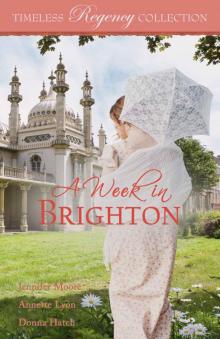 A Week in Brighton (Timeless Regency Collection Book 13)
A Week in Brighton (Timeless Regency Collection Book 13)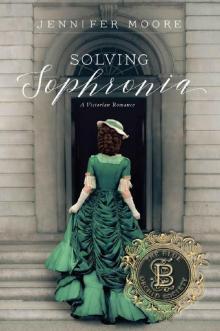 Solving Sophronia (The Blue Orchid Society, #1)
Solving Sophronia (The Blue Orchid Society, #1)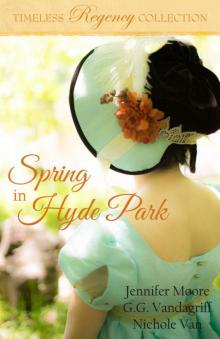 Spring in Hyde Park
Spring in Hyde Park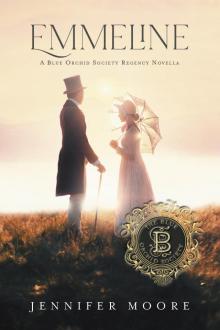 Emmeline
Emmeline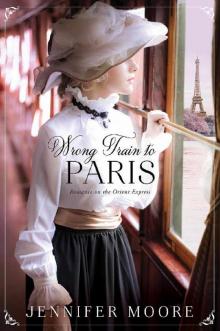 Wrong Train to Paris (Romance on the Orient Express, #2)
Wrong Train to Paris (Romance on the Orient Express, #2)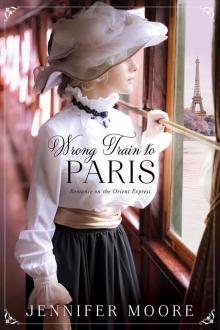 Wrong Train to Paris
Wrong Train to Paris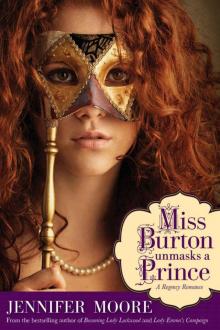 Miss Burton Unmasks a Prince
Miss Burton Unmasks a Prince Safe Harbor
Safe Harbor The Sheik's Ruby
The Sheik's Ruby Change of Heart
Change of Heart Lady Helen Finds Her Song
Lady Helen Finds Her Song Simply Anna
Simply Anna